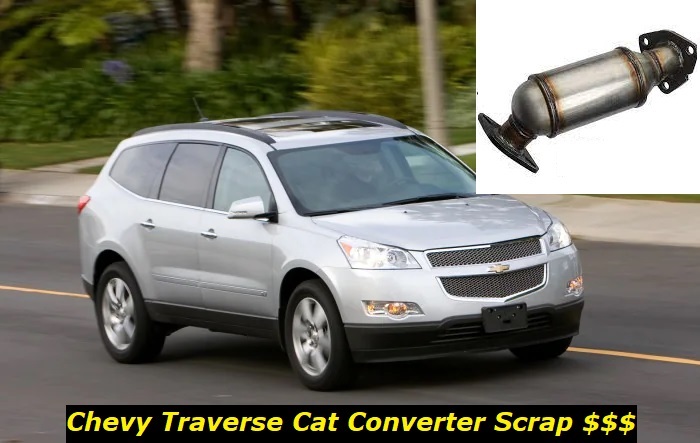There have been two generations of the Chevrolet Traverse. The first one appeared in 2009 and the second-gen Traverse started selling in 2018. Today, we are going to concentrate on first-generation SUVs because we are talking about scrap catalytic converters. It's important for older cars that have already made over 150,000 miles and now have clogged or broken cats.
Today, we'll tell you everything we know about scrap catalytic converter prices for Chevy Traverse and the way you can sell these cat converters. We'll discover the types of cats you may sell for better money and the companies that will agree to buy your cat converters. It's important to know this before you start doing anything with your old OEM cat.

Here's what we'll tell you about:
- The types of converters and their location in the Chevy Traverse.
- The estimated lifespan of the OEM catalytic converter in the Traverse.
- The scrap price of the cat converter from your Chevy Traverse.
- Who will buy the converter from the Chevy SUV?
- Will you need a replacement converter for your Traverse?
Let's get started!
What are the types of OEM converters in the Chevy Traverse?
The types of catalytic converters are pretty average in this car. The Traverse in the first generation used only one engine - the 3.6L V6. This means that the engine has two heads and two exhaust manifolds. Why is this so important? Because each exhaust manifold should have a pre-cat in it or near it. These pre-cats rarely malfunction, but you should also know about them.
Our interest today is not in pre-cats though. We will concentrate on the main catalytic converter. In most cases, there is one main cat converter in the system. But in Traverse, you should expect both pre-cats and main cat to malfunction at more or less the same time. Also, we should say that pre-cats in these cars will cost as much as the main converter.
Here's what you should know:
- pre-cats and main converters may be all sold as scrap parts, they contain some platinum, and palladium, also main converters have some rhodium;
- unfortunately, Chevy OEM converters aren't very rich for these metals, so the prices won't be really high;
- these cats are considered domestic, so you won't get really high price offers, but still, companies will gladly buy these converters;
- it's important that you have OEM cats for sale because aftermarket catalytic converters will cost much less money;
- these cats should all have serial numbers on them, you may check the numbers and check them online to understand what type of converter you have in your hands;
- all converters are integrated into the exhaust system, so taking them out of the car is not a very trivial task;
- you should go to the exhaust shop to have everything deleted and installed correctly, some welding is going to be needed for aftermarket cats.
So, every Chevy Traverse has some OEM catalytic converters in its exhaust system. Once they start malfunctioning or get clogged, you can sell them. For the money you get from these converters, you can buy new cats and install them. Of course, the money you will get will not cover the full costs but it will help you spend less of your own funds.
Make sure you choose the right exhaust shop to have all the things done. If you ask the wrong person to delete the cats, you may just lose them because they will be damaged or even destroyed in the process.
How long will the OEM catalytic converter live in your Traverse?
This is not a very simple question to answer. Each car is individual because a lot of factors influence the longevity of your catalytic converter. In one case, the Traverse will be used in off-road conditions and the cat converter may be just hit over a rock or something like that. In other cases, the Traverse may be fed with poor cheap fuel. These factors will change the durability of the converter in your vehicle.
But the average lifespan of the cat converter in your Traverse is about 10-12 years or 150,000 miles. Some owners of the Chevy SUV will still drive their cars with OEM converters installed in them for more than 250,000 miles. While some other owners will have to replace cats earlier than their vehicles hit 100,000 miles.
What's the average price of a Chevy Traverse catalytic converter?
The average pre-cat from a Traverse will cost about $150, while the main converter has an estimated price of $140. Pre-cats that are placed near the exhaust manifold are quite big in this engine and they cost more than other pre-cats in other cars. Though, they don't fail that often, so the main converter is likely to be broken and sold more often.
These are the estimated prices for an OEM catalytic converter, not an aftermarket one. The aftermarket cat should cost about $30, no matter which type it is. Buyers hate buying those aftermarket cats because they never know if they can extract at least any precious metals from them.
Here are the important things that influence the price offer for your cat converter:
- the serial number that you can find on the body of the converter;
- the condition of the part - completely destroyed cats are hard to sell at a good price;
- the prices for precious metals like platinum and palladium on the market;
- the way you are selling your converter.
While you can't change the first three factors and have to take them for granted, you can still influence the price by finding the company that is ready to pay more for your converter. It may seem hard, but actually, it will take just about one hour of your time.
How to find the best buyer for your Chevy Traverse converter?
Searching for a really good and generous buyer is not that simple. But we'll give you some clues. Let's first think about who may buy the converter that you have taken off the Chevy Traverse.
There are different private buyers and companies:
- exhaust shop workers;
- auto part store owners;
- scrapyards;
- middlemen and resellers;
- people on eBay;
- recycling companies.
We would recommend selling your Traverse catalytic converter in two possible ways: on eBay or to a recycling company. All other ways are just bad and will not give you a lot of money.
We recommend the eBay option for those only who have good catalytic converters that can still work and pass the fog test if installed in a Chevy Traverse. If you want to sell the scrap converter, then better go to recycling companies.
Here's how you can find the best one:
- take the converter off the Chevy Traverse and clean it to see the serial number;
- take a couple of pictures of the cat;
- find three of four websites representing recycling companies;
- use their websites to send them inquiries about the price and send those pictures;
- wait till all of them answer back and offer their prices;
- make sure you choose the best company given some of them will pay for shipping.
You will just need to compare the offers and then choose the company that pays more money than others. This will take you just an hour or so and you'll be able to know the average price of the Chevy Traverse cat.
Of course, the average prices we've given above are just estimated and they can change all the time. If you read this article half a year after it was written and published, the real prices will be very different and you should check them with recycling companies first.
Will you need the replacement catalytic converter for your Traverse?
Yes, nearly all states in America require that every car is equipped with a catalytic converter. If you delete the converter and install just a metal pipe instead, you will have to pay a fine right after the next fog test. Also, you will fail the emission test and will have to install the normal converter if you still want to drive your Traverse.
So, yes, you will need a replacement converter for the Chevy Traverse unless you are going to scrap the car. If you aren't going to drive the Chevy SUV on public roads, the emission test isn't needed and the converter may be out of the car with no consequences.
Final words
We know for sure that many Americans sell their catalytic converters at much lower prices than they may. The reason is a lot of misinformation on the internet. It means that you should know how to sell the catalytic converter that is not going to work properly anymore. And in this article, we've outlined some ways to do that.
Also, we've given you a guideline on how to learn the up-to-date price for your type of catalytic converter using the services that recycling companies offer. In most cases, they will provide you with all the needed information free of charge.
About the authors
The CarAraC research team is composed of seasoned auto mechanics and automotive industry professionals, including individuals with advanced degrees and certifications in their field. Our team members boast prestigious credentials, reflecting their extensive knowledge and skills. These qualifications include: IMI: Institute of the Motor Industry, ASE-Certified Master Automobile Technicians; Coventry University, Graduate of MA in Automotive Journalism; Politecnico di Torino, Italy, MS Automotive Engineering; Ss. Cyril and Methodius University in Skopje, Mechanical University in Skopje; TOC Automotive College; DHA Suffa University, Department of Mechanical Engineering






Add comment